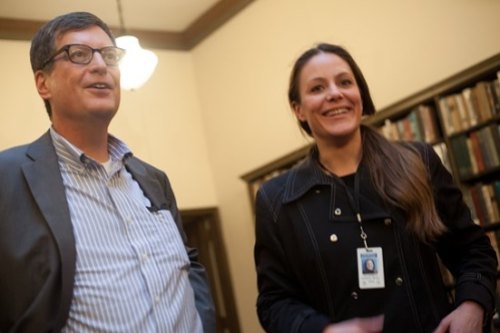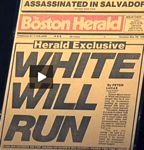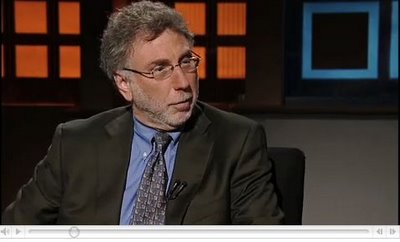Many thanks to Emily Rooney for giving me a chance to talk about “The Wired City” on “Greater Boston” Monday evening. You can watch it above or on the “Greater Boston” website.
Tag: “Greater Boston” Page 2 of 3
I’m scheduled to talk about “The Wired City” on “Greater Boston” (WGBH-TV, Channel 2) with Emily Rooney today at 7 p.m., though I’m told I may get bumped for breaking news. I’ll update this if necessary.
Tomorrow at 1 p.m. I’ll be a guest on “Boston Public Radio” with Jim Braude and Margery Eagan (WGBH Radio, 89.7 FM) to talk about “The Wired City” and to unveil a collaboration I’ve been working on with ’GBH. Exciting stuff! Hope you can tune in.

Christine Stuart and me at last Thursday’s book event in New Haven. Stuart, who runs the online news service CT News Junkie along with her husband, Doug Hardy, was the first person I interviewed for “The Wired City.”
Many thanks to Paul Bass, editor and publisher of the New Haven Independent, and Will Baker, director of the Institute Library, for a terrific event for “The Wired City” last Thursday. It was great to catch up with folks I hadn’t seen in quite a while and to meet new people. The Independent’s Thomas MacMillan covered the event here; the New Haven Register’s Randall Beach and Melanie Stengel here.
Closer to home, Will Broaddus of The Salem News interviewed me last week for his book column.
I’ve got three events coming up during the next week that you might be interested in.
• On Wednesday at 6 p.m. I’ll be part of a panel that will discuss the New England premiere of “Corporate FM: The Killing of Local Commercial Radio,” directed by Kevin McKinney. It’s not cheap, but it’s for a good cause: The event will benefit WHAV Radio, an independent online-only radio station based in Haverhill. The screening will take place at Chunky’s Cinema Pub, 371 Lowell Ave., Haverhill. You can find out more here.
• On Thursday at 6:30 p.m. I’ll be doing an event for “The Wired City” at the Globe Lab, which works on new technology projects for The Boston Globe. The lab is located at the Globe, which is at 135 Morrissey Blvd. The event is free and open to the public.
• Next Monday, June 24, I’ll be sitting down with Emily Rooney to talk about “The Wired City” on “Greater Boston,” on WGBH-TV (Channel 2).
Photo by Thomas MacMillan for the New Haven Independent.
 Joe Kahn wrote a smart piece on the future of the Boston Phoenix — ahem, The Phoenix — in Tuesday’s Boston Globe.
Joe Kahn wrote a smart piece on the future of the Boston Phoenix — ahem, The Phoenix — in Tuesday’s Boston Globe.
As you may know, the current issue of the Phoenix, lowercase the, is the last as a newspaper. This week, The Phoenix will debut as a free weekly glossy magazine, combining news and arts coverage from the Phoenix with some lifestyle content from Stuff, a magazine that will cease to exist as a standalone. And if you’re worried about The Phoenix’s straying from its alternative roots, keep in mind that the Phoenix had lots of lifestyle content in the 1990s. I look at this as a recalibration more than a complete reinvention.
The unusual aspect to this story, and one we Bostonians take for granted, is that the founder, Stephen Mindich, is still at it, and in fact has taken charge of the new publication. In an era of corporate chain media, The Phoenix, at 46, is still proudly independent. Mindich recently talked about his long career with Emily Rooney of “Greater Boston.”
The story of the Boston Phoenix, as with other alternative weeklies, is that it was heavily dependent on classified ads — not just the personals, but everything from a band needing a bass player to a student looking for a roommate. Needless to say, nearly all of those ads have moved to Craigslist.
And at a time when many newspapers, including the Globe, are asking their readers to pick up an increasing share of the costs through home delivery and digital subscriptions, The Phoenix is free both in print and online.
It’s a tough model for the Internet age, but glossy should enable The Phoenix to attract some of the high-end advertising it needs in order to thrive. In that spirit, I think former Phoenix contributor Mark Leccese, now a journalism professor at Emerson College and a blogger for Boston.com, was too pessimistic in his own recent assessment.
I’ve got my collector’s item from last week, and I’m looking forward to grabbing a copy of the new magazine as soon as I can. As most of you know, I was the Boston Phoenix’s media columnist from 1994 to 2005, and I still contribute occasionally.
I wish all the best to Mindich, executive editor Peter Kadzis, editor Carly Carioli and all my friends who are still there. See you tonight.
Now, here’s some must-see TV. Unfortunately, it doesn’t sound like we’re going to see it. Frank Phillips reports in the Boston Globe that former Boston Herald columnist Peter Lucas and the late Boston mayor Kevin White’s press secretary, George Regan, practically had to be separated by host Emily Rooney yesterday on the set of “Greater Boston,” on WGBH-TV (Channel 2).
Lucas, as you may know, had a legendary front-page exclusive in 1983 reporting that White would seek a fifth term. Lucas was wrong, and apparently on Tuesday he repeated his contention that White deliberately misled him as punishment for his tough, occasionally mocking coverage. Phillips writes that Lucas and Regan got into it hammer and tongs:
But the screaming match appears to have centered on whether White intentionally misled Lucas about his plan to run again, causing the erroneous headline and story or whether Lucas misinterpreted what White told him. The verbal exchange was intense enough that Rooney was forced to junk the take, calm down her guests, and reshoot the segment so it was suitable for television.
 In an interview with Phillips, Regan denies that White intentionally misled Lucas. But as I wrote yesterday, I’ve heard Lucas discuss the incident before. It’s a great yarn — in Lucas’ telling, White gave Lucas the exclusive on the condition that Lucas not identify the mayor as his source, and then pulled the rug out from under him.
In an interview with Phillips, Regan denies that White intentionally misled Lucas. But as I wrote yesterday, I’ve heard Lucas discuss the incident before. It’s a great yarn — in Lucas’ telling, White gave Lucas the exclusive on the condition that Lucas not identify the mayor as his source, and then pulled the rug out from under him.
Lucas also claims that then-state treasurer Bob Crane was incredulous, telling Lucas he could have warned him away from the story. I’m not going to try to reconstruct something I heard Lucas say some 25 years ago, but essentially he responded that he saw no need to check in with Crane when he’d gotten his information directly from White.
Former Boston Herald editor Kevin Convey, who was a Herald staff member in 1983, tweeted this morning, “There was no doubt in Lucas’ mind or in the minds of the editors” that White had deceived him.
The “Greater Boston” segment was reshot, and Rooney’s conversation with Lucas and Regan is civil and noncontroversial. (Disclosure: I’m a paid contributor to “Beat the Press,” the Friday edition of “Greater Boston.) You can watch it above. The Lucas-Regan segment begins at 19:45.
Three observations: (1) I believe Lucas, even if White may have left himself some wiggle room; (2) I hope he writes about it; (3) it does not tarnish White’s legacy in any way to believe he was involved in a political prank of that magnitude. It only adds to his legend.
Friend of Media Nation Rory O’Connor will appear on “Greater Boston” this evening to talk with Emily Rooney about the 30th-anniversary edition of his book “Nukespeak: The Selling of Nuclear Technology from the Manhattan Project to Fukushima.”
As you can tell from the title, the book has been revised and updated. Co-written by O’Connor, Stephen Hilgartner and Richard C. Bell, it’s being published as an e-book by Sierra Club Books. You can find out more here.
The program begins at 7 p.m. on WGBH-TV (Channel 2).
My friend and former (and future!) colleague Adam Reilly is leaving the Boston Phoenix to become an associate producer for “Greater Boston,” at WGBH-TV (Channels 2 and 44).
Adam has ably handled the media beat since 2006, writing the “Don’t Quote Me” column and the media blog. Before that, he’d served as the paper’s political columnist.
Since the late 1980s, just three people have covered the media for the Phoenix — Mark Jurkowitz, now associate director of the Project for Excellence in Journalism in Washington; yours truly; Mark again; and then Adam. For a press critic, it’s one of just a handful of jobs in the country where you really get a chance to make a difference. No doubt a long line of applicants will form outside the Phoenix’s door.
Good luck and best wishes to Adam, a transplant from Minnesota who’s managed the difficult trick of establishing himself as a true Bostonian.



Names, faces and anonymous comments
By Dan Kennedy
On June 22, 2010
In Media
Click on image to visit "Greater Boston"
Have we reached the final days for anonymous news-site commenters? Probably not — that’s more hope than reality. But there’s no doubt the tide is shifting away from the anonymous and pseudonymous insults, libel and hate speech that comprise the majority of comments at news sites.
This past Sunday, the Boston Globe Magazine posted a feature by Neil Swidey on the anonymous commenters who waste electrons on the Globe’s website, Boston.com. Except that Swidey didn’t quite succeed. The truly anonymous whackos with whom he hoped to connect refused to crawl out from under their rocks. Instead, he ended up with a highly entertaining profile of two men who didn’t mind revealing their identities and to a female Red Sox fan who all but identified herself. Swidey writes of his quest to interview the worst of the worst:
The story is accompanied by a video starring the two men. Also, last night Swidey talked about the story with “Greater Boston” host Emily Rooney on WGBH-TV (Channel 2). I couldn’t find a direct link, but you’ll find it easily enough if you click here or on the image above.
For much of the year, the news business has been growing increasingly uneasy over anonymous comments. Swidey himself discusses some of the problems — legal challenges that could force news organizations to help potential libel plaintiffs expose commenters they want to sue, and the bizarre situation at the Cleveland Plain Dealer, which outed a judge who had apparently been commenting on her own cases under a pseudonym. (For what it’s worth, Media Nation started requiring real names earlier this year.)
As Rooney points out in her interview with Swidey, just yesterday the Buffalo News announced that it would soon banish anonymous comments. And American Journalism Review editor Rem Rieder has called for an end to anonymity, pointing out that the same newspapers that allow them customarily ban anonymous letters to the editor and do not allow unnamed sources to level personal attacks. Rieder writes:
One alternative, which I’ve mentioned before, is to use Facebook as a commenting system. Nearly everyone on Facebook uses his or her real name, usually accompanied by a photo. The Globe itself is among newspapers that posts links to some of its stories on Facebook, where you will find a far more civil conversation than what’s on Boston.com.
Anonymous commenting is an idea whose time has come and gone. Whatever hopes early Internet visionaries had that anonymity could be compatible with community have long since proven to be wrong. I hope Swidey’s story serves as an inadvertent spur to the Globe — and to other news organizations — to end this failed experiment.